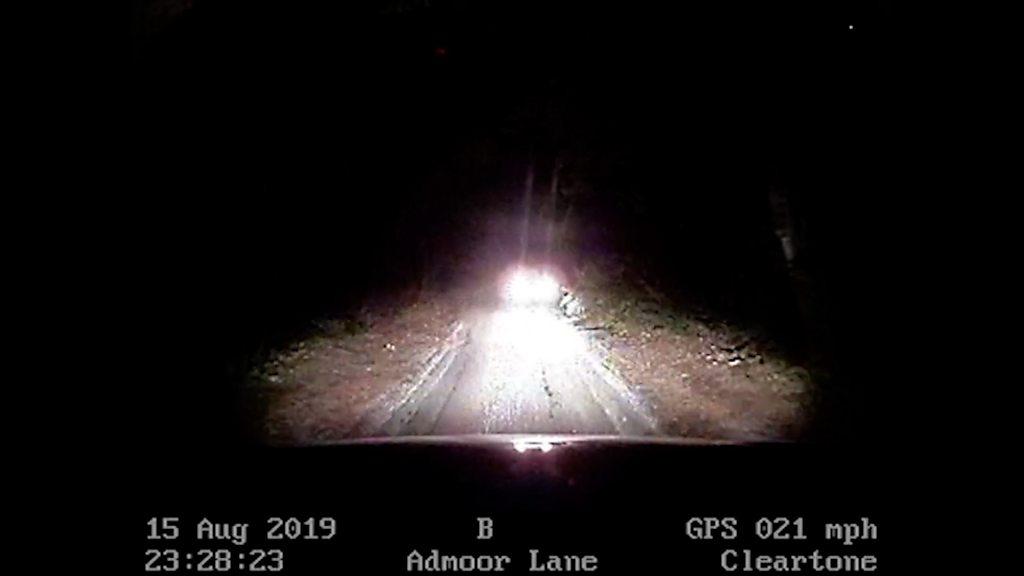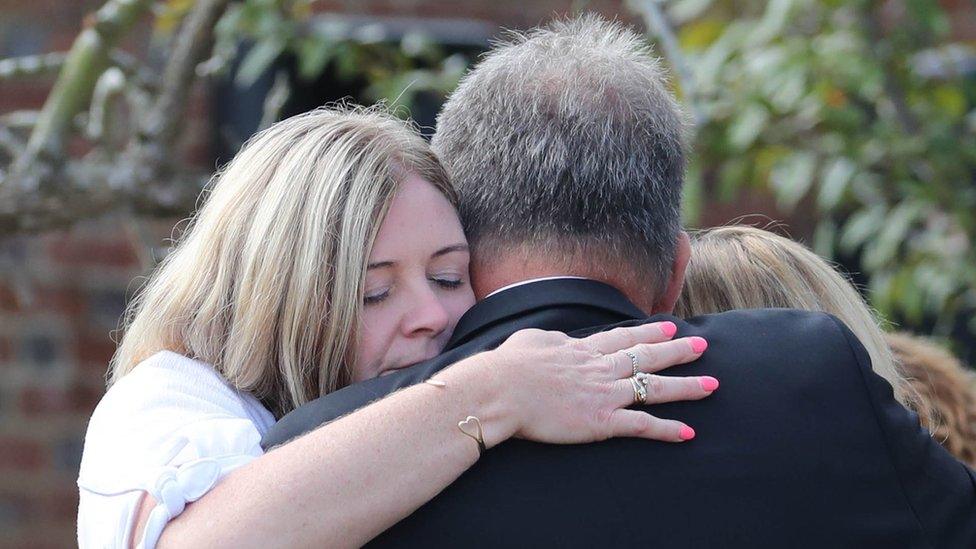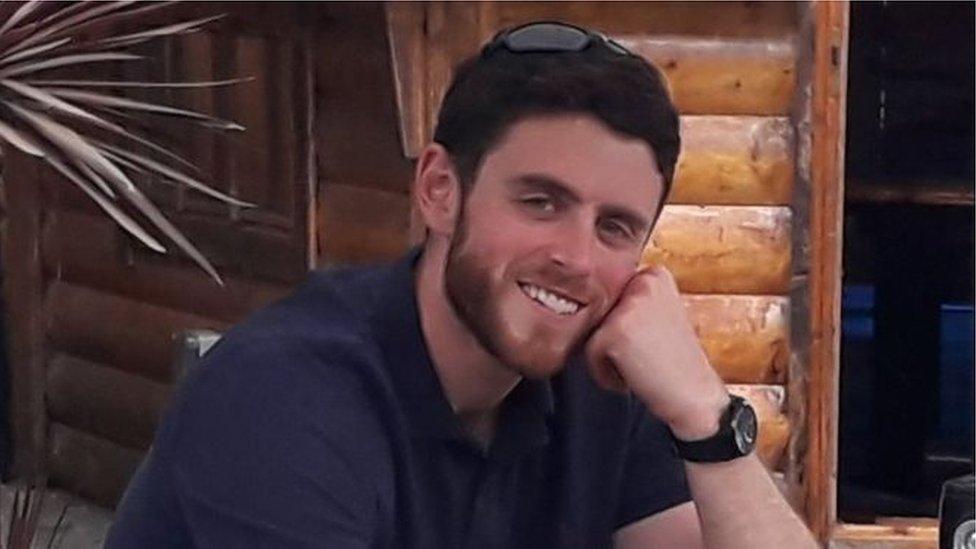PC Andrew Harper death: Innocent man's family 'torn apart' by murder charge
- Published

Jed Foster was charged over the killing of PC Andrew Harper and spent a month in prison
An innocent man accused of murdering PC Andrew Harper has said he feared he "could die in prison".
Jed Foster was charged over the killing of the police officer and spent a month behind bars before proceedings against him were dropped.
The 21-year-old told the BBC he worried about being wrongly convicted and said the "terrifying" experience "broke me and tore my family apart".
He has now started legal action against Thames Valley Police.
On Friday, teenagers Henry Long, Albert Bowers and Jessie Cole were convicted of the manslaughter of PC Harper.
The officer, who was responding to a report of a quad bike theft in Berkshire, suffered catastrophic injuries when his ankles got caught in a strap trailing behind a car driven by Long in August 2019.
But four days later Mr Foster, who lives near Reading, was the first suspect charged.

Mr Foster has started legal action against Thames Valley Police
The case against him was eventually discontinued and he was released from custody in September, but by then his family had been bombarded with hate mail and people "wrote on social media that I should be hanged or hang myself", he said.
"Newspapers targeted me and my family even though I had not been convicted. They acted as though I was guilty."
He said he was also targeted with abuse because of his family's traveller heritage.
Despite his protestations of innocence, Mr Foster was charged by the Crown Prosecution Service under the Threshold Test.

When is the Threshold Test applied?
There are reasonable grounds to suspect the person has committed an offence
There are reasonable grounds to believe that continuing the investigation will provide evidence that is capable of establishing a realistic prospect of conviction
The seriousness of the case justifies an immediate decision
There are valid objections to bail
A charge is in the public interest
Source: CPS

"I could prove even then I was not involved, but the police did not seem to be interested," Mr Foster said.
"I was arrested and then charged with murder and spent several weeks in prison accused of an offence that I did not commit."
He said the police "appeared to just to want to find someone to blame for the death of their colleague and were not concerned whether I was actually involved".
Thames Valley Police declined to comment on Mr Foster's claims.
"It was terrifying being accused of a murder I had not done," he added.
"I knew I was innocent, but I was worried that I would be wrongly convicted, and that for the murder of a police officer I could die in prison."

PC Andrew Harper, from Wallingford, died when his ankles got caught in a strap trailing behind a car
As detectives continued to gather evidence they found Mr Foster had an "electronic alibi".
The reasons for Mr Foster's release can only be reported now because a judge ruled their disclosure might have prejudiced the trial of the three men eventually convicted.
During the hearing in September, prosecutor Jonathan Polnay said Mr Foster was arrested at the Four Houses Corner caravan site where the Seat Toledo, which dragged PC Harper to his death, was found.
The court heard officers who seized Mr Foster's phone found "highly incriminating" messages.
But when they analysed the GPS and location data on the phone it showed he was not in the vicinity of the crimes when they were committed.
'Living nightmare'
Representing Mr Foster at the Old Bailey hearing, Jeremy Dein QC said his client was working full time when he was arrested and had no previous convictions, although he did have two cautions for minor matters.
The barrister said Mr Foster's time in custody had been "a living nightmare".
Mr Dein told the court his client had answered police questions "on six separate occasions [and] adamantly maintained he had no involvement".
Mr Foster said he had "every sympathy with the family of PC Harper and the loss they have suffered".
He said the evidence presented in court last year proved he was innocent and "had nothing to do with PC Harper's death".

Jessie Cole, Henry Long and Albert Bowers (L-R) are due to be sentenced at the Old Bailey
He said he was "pleased that everyone now knows that I am innocent", but added he did not feel that "I have had any justice for the way that I was treated by the police".
"This experience broke me and tore my family apart - we are all still trying to recover from it," he said.
Mr Foster's solicitor, Michael Oswald, said it was "entirely understandable that Thames Valley Police wanted to bring to justice anyone involved in the death of PC Harper".
But he said the force "cannot justify or excuse the devastating impact on Mr Foster when they wrongly identified him as being responsible".
He added: "The actions of the police meant that he spent several weeks in prison - and in the spotlight of intrusive national media attention - accused of murdering a police officer, an experience from which he and his family are still struggling to recover.
"It is now a matter of public record that the evidence proves he is completely innocent.
"By way of the proceedings that have been issued, Mr Foster looks to Thames Valley Police to accept that he should in fact never have been arrested or prosecuted and to take now all possible steps to mitigate the damage they have caused and allow him to move on with his life."
Thames Valley Police said it had "received notification of a potential compensation claim from Jed Foster's solicitors so it would be inappropriate to make any further comment at this stage".
- Published24 July 2020

- Published24 July 2020

- Published24 July 2020

- Published24 July 2020

- Published24 July 2020

- Published27 October 2019

- Published23 August 2019

- Published22 August 2019

- Published25 June 2020
